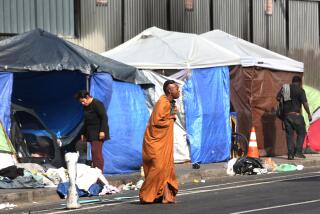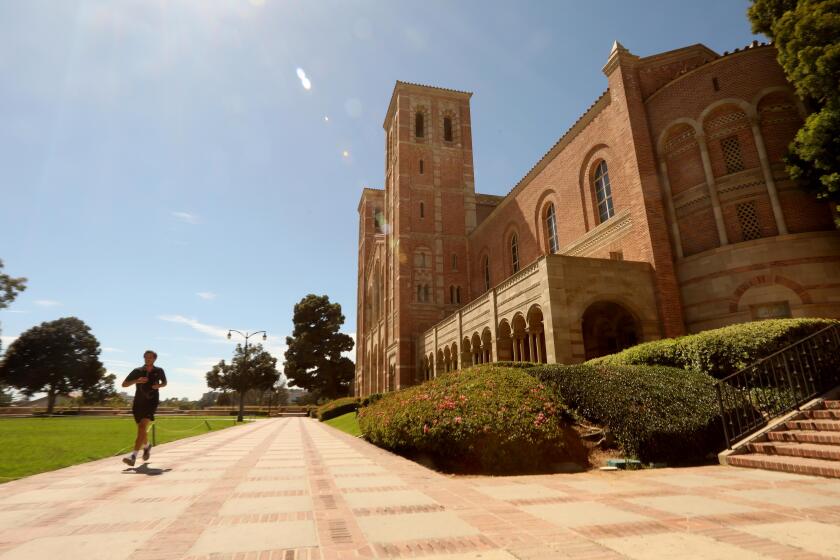Life in the Slowest Lane : Some of the countyâs estimated 4,000 homeless live along the freeways, mainly, they say, because theyâre out of sight and not likely to get rousted
Willie Roland says he doesnât need a Christmas tree this year. âI live under one,â he says. And besides, John, his neighbor down the way whoâs dying of cancer, already has a tree.
George has one too, donated by the owner of a nearby tree lot. His 4-foot-high tree, bedecked with candy canes, sits atop a muddy mound of rubbish and rusty bicycle wheels, surrounded by the squalor of the shantytown along the Riverside Freeway in Anaheim.
âIâve been on the streets since February,â George says. âI had some family problems, I lost my job, I had no unemployment benefits. So there I was, left with nothing.â
George, 39, came to the tent city along the freeway because the police mostly leave people alone there, and the inhabitants help one another. Like Tuesday night, when three newcomers were causing trouble in the neighborhood and âbringing the heat.â They were asked to leave and responded with 4-by-4s.
âHuman beings are basically territorial,â George says. âI got whacked . . . broke two of my ribs. We ran them off, but itâs a good thing I had someone here with me.â
About 20 people live at this particular settlement, which sprang up about a year ago, the residents say. Some live on a privately owned lot at the Lemon Avenue exit, while others live on Caltrans property back along the freeway.
Other temporary settlements spring up from time to time along the Garden Grove, San Diego and Santa Ana freeways, Orange County Caltrans spokesman Albert Miranda said.
No one knows how many of the countyâs estimated 4,000 homeless people live along the freeways. They seek shelter there because they are out of sight and, in most cases, off private or city-owned property, where authorities would be more likely to roust them, they say.
But shelter for some of these people may be fleeting. Anaheim officials say those living on private property may be evicted soon, probably after the holidays. If they are moved out, they will likely find another place to live along the freeways.
âThereâs always going to be areas (along the freeways) that are overgrownâ Miranda said. âThey donât really present a problem for us unless weâre working in that area.â
If they can stay dry in their lean-tos, the Riverside Freeway dwellers eschew temporary shelters such as the National Guard Armory in Fullerton, preferring to stay where they can keep an eye on their belongings and hide in the dense shrubbery.
Georgeâs âcondo,â as the freeway dwellers call their lean-tos, consists of a sheet of plastic stretched out from a wire fence--about 20 square feet. His blankets, food and clothes are stuffed inside. Itâs enough to keep him warm and dry, even in the recent heavy rains, he says.
James, a transient from Georgia, was less fortunate. He and his girlfriend share a hovel that is a crudely constructed mess of mud, tar paper, plastic and branches--a âhomeâ that offers little protection from the rain.
âEverything got soaked last night,â James said Wednesday morning, drawing his arms tight around his shoulders for warmth. âItâs warmer right now in Georgia than it is here, when it oughta be the other way around.â
Willie Rolandâs condo, in a more secluded spot east of Lemon on Caltrans property, is palatial by contrast--two rooms, carpet remnants on the floor and walls, all under a well-constructed tent of plastic and metal framing that is built into an overgrown, fallen evergreen.
âThey all said they were going to come over here and decorate my tree with lights,â said Roland, 53. âI said, âOh, no youâre not.â â
One recent afternoon, Roland had four guests in his dwelling, sharing opinions, soda crackers and generic beer. There were:
- Ed (Red) Howarth, at 37 the youngest of the bunch. âIâm company--I live in Anaheim Hills,â he joked. He lives in a car in a nearby parking lot. âOnce you fall down, itâs hard to get back up in a system thatâs designed to keep you down. If you donât have a phone number or address, youâre not a person.â
- Richard (Cowboy) Graack. âIn the 7 years in Orange County, there was one time we lived in a house,â Graack says. âThat was when both me and my girlfriend were working. We paid $425 a month, then they raised the rent to $650 and we were back out.â
- Willie Fifer, Graackâs girlfriend. She has the flu. Sometimes she works as a nurseâs aide in convalescent homes, but during the holiday season, people tend to take care of their own and there is less work, she says. âWhen I go to work, I go to a motel. . . . The attitude here is that most street people are dope fiends, but itâs not true.â
- Robert Bowersock. He is staying with Roland, and a Christmas card from his mother adorns one of the carpeted walls. âFrom Our House to Your House,â it says.
Roland insisted that his guests keep his home clean, and cigarette ashes were dumped into an orange trash sack provided by a Caltrans worker. Two coats hung from a wall hook. Soup cans and jars of mustard and peanut butter were neatly stashed on wooden shelves along one wall.
A car battery sits on the floor in the front of Rolandâs shack. It used to power a small TV and radio, but thieves made off with both.
âThey give you something, and you try to figure out how to make it work, and you fix it,â says Roland, growing angry. âThereâs no reason to steal from somebody who donât got nothing. Why would anyone do that?â
Bowersock, the house guest, nods in agreement. âThere are some bad people on the street, but we try to get rid of them if they come here.â
The group plans to have a Christmas celebration among themselves. Some people have recently brought them food, but they are in need of certain items, George says. âWe could use a turkey, and can openers. We only have one for all of us.â
Roland scavenges trash cans and the leftovers from a weekend swap meet at the drive-in theater right behind his home for materials to improve his house and to repair discarded bicycles, which he sells for $5 once they are in working order.
Another man from the camp walks by and pokes his head in. âWillie, didnât you say you needed some tire patches? Here, I got you some,â he said, tossing Roland the package.
âAppreciate it,â Roland said. The man had already gone.
Sometimes truck drivers stop and drop off sheets of plastic or beer, he says. The Highway Patrol stops in too, and sometimes tells them to move on.
âWe respond normally when we have a complaint,â said CHP Officer Mike Lundquist. âWe receive calls of fires in that area, cooking fires. Theyâre in close proximity to the freeway, and people have run off the freeway at those locations.â
âWe have to be concerned with their safety,â Lundquist said.
Roland says that while the CHP says they should leave, Caltrans workers tell them they can stay if they donât cause any problems.
âWhat are we supposed to do?â he asked. He doesnât want to leave, and he would rather pass his days as he does than work for minimum wage. âMy brothers, they live in fancy houses in Fresno and pay $9,000 a month rent and owe money to everybody,â Roland says. âI donât owe nobody a damn dime.â
More to Read
Sign up for Essential California
The most important California stories and recommendations in your inbox every morning.
You may occasionally receive promotional content from the Los Angeles Times.










